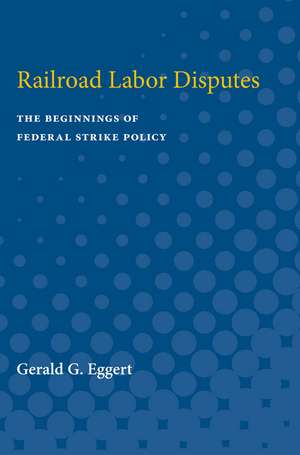Railroad Labor Disputes: The Beginnings of Federal Strike Policy
Autor Gerald Eggerten Limba Engleză Paperback – 1967
Preț: 287.03 lei
Nou
Puncte Express: 431
Preț estimativ în valută:
54.93€ • 58.73$ • 45.79£
54.93€ • 58.73$ • 45.79£
Carte tipărită la comandă
Livrare economică 17 aprilie-01 mai
Preluare comenzi: 021 569.72.76
Specificații
ISBN-13: 9780472751242
ISBN-10: 0472751247
Pagini: 324
Dimensiuni: 152 x 229 x 25 mm
Greutate: 0.51 kg
Ediția:First Edition
Editura: UNIVERSITY OF MICHIGAN PRESS
Colecția University of Michigan Press
ISBN-10: 0472751247
Pagini: 324
Dimensiuni: 152 x 229 x 25 mm
Greutate: 0.51 kg
Ediția:First Edition
Editura: UNIVERSITY OF MICHIGAN PRESS
Colecția University of Michigan Press
Notă biografică
Gerald G. Eggert is professor emeritus of history at Penn State University. He is the author of Harrisburg Industrializes: The Coming of Factories to an American Community.
Descriere
Explores the United States' first national labor crisis—the railroad strikes of the 19th century









